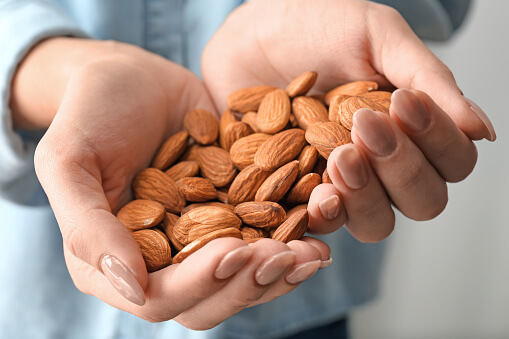Brain-healthy foods to fight memory loss
Key Takeaways
Eating well is not just good for the body, but good for the brain. And while the vital roles a good diet and proper nutrition play in maintaining good overall body health are well accepted, their roles in maintaining your brain health is something that you may not often think about.
Certain foods and the nutrients they contain seem to be especially conducive to promoting good brain health. More and more studies are coming out to show just how important diet is for proper brain function, as researchers continue to show that many of the conditions of the aging mind—including memory loss, dementia, and even Alzheimer disease and Parkinson disease—may be mitigated by including certain foods in the diet.
Here are just a few of the foods that may help you preserve brain function, which—just like other bodily functions—only declines with age.
Almonds

Almonds can benefit memory function, and contain lots of vitamin E, which plays a significant role in preventing cognitive decline. In a preclinical study, researchers found that rats who received injections of almond suspension for 28 days demonstrated significant improvements in memory retention. In addition, almonds contain vitamin B6, a pyridoxine that helps the body metabolize proteins, which are essential for cellular repair in the brain.
As if this weren't enough to convince you that almonds are good for brain health, they also contain zinc to boost the immune system and prevent damaging infections, vitamin E to slow cell aging, and protein to help repair brain cells.
Eggs

Eating whole eggs—not just the whites—can give you some brain benefits that you may not have been aware of. Egg yolks contain choline, which helps regulate memory and even reduce the risk of Alzheimer disease. Choline is so essential, in fact, that the American Medical Association House of Delegates recommends the addition of choline to prenatal vitamins due to its importance in promoting cognitive development during pregnancy. Researchers have shown that infants exposed to higher levels of maternal choline (930 mg/d) during the third trimester exhibited improved information processing speed—an indicator of cognition and intelligence—during the first year of life.
Eggs also contain lutein—long known for its role in eye health—which is also beneficial for cognition. In one study, researchers assessed the association between brain lutein and cognition in children. They measured brain lutein noninvasively, via Macular Pigment Optical Density (MPOD), and found that the MPOD concentration was positively associated with academic performance.
Flaxseed

Flaxseed contains omega-3 fatty acids, which are known to help brain health. In a preclinical model of perinatal hypoxic-ischemic encephalopathy, researchers found that maternal intake of flaxseeds attenuated loss of brain mass, improved spatial memory in offspring, and prevented depressive symptoms. Flaxseeds are also rich in magnesium and vitamin B, which are essential for optimal brain performance.
Kale

Considered a superfood, kale is chock full of antioxidants, calcium, and vitamin K, so it's good for your physical health. But, it's also good for your mental health. Recently, Tufts researchers found that people who ate 1 serving/day of green leafy vegetables had cognitive functioning akin to that of people 11 years younger, compared with those who ate fewer or no leafy greens. The key ingredients in kale that do this include phylloquinone, lutein, nitrate, folate, alpha-tocopherol, and kaempferol, which may all mitigate the cognitive decline that comes with aging.
Oranges

Did you know vitamin C provides protective effects on your brain and your cognition? In fact, vitamin C is vital for good brain health: it promotes the functioning of specific brain cells, and may even prevent conditions such as Parkinson disease and Alzheimer disease. Its high antioxidant activity is the reason why. In a review of 50 studies, researchers found that vitamin C concentrations were higher in participants who were cognitively intact, compared with those who were cognitively impaired.
Pumpkin seeds

Pumpkin seeds are filled with zinc, magnesium, copper, and iron—minerals that are all known to be beneficial for cognitive health. Zinc and iron deficiencies both independently increase the risk of developing brain disorders, while magnesium has been shown to stave off memory loss and neurological diseases. Finally, copper has been shown to help prevent Alzheimer disease in individuals who are copper deficient.